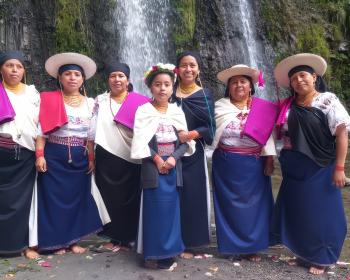
By Giulia McDonnell
On July 8, 2016, the U.S. Supreme court ruled that Ecuador must pay the oil company Chevron $96 million for breaching a contract from 1973. This 1973 contract consisted of an arrangement between Chevron and the government of Ecuador, which stated that Chevron would be able to cultivate oil fields in the Amazonian rainforest if the oil company agreed to provide consumers with oil at below market prices. However, in 1992 the contract was ended as the government of Ecuador claimed that Chevron was causing irreversible damage to the environment through countless unsupervised oil spills.
In November of 2013, the Supreme Court in Ecuador ruled that Chevron owed Ecuador $9.51 billion for environmental damage, but lawyers in Ecuador have still not succeeded in pressuring Chevron to administer the payment. Chevron claims the ruling was obtained solely through corruption. The Union of Affected Peoples by Texaco (UDAPT), which is made up of more than 30,000 Indigenous and rural farmers, has issued a statement condemning the Supreme Court Ruling forcing Ecuador to pay more than $96 million to Chevron. The UDAPT is urging the government of Ecuador to pay the sum of money to the victims of the environmental crimes committed by Chevron, instead of granting the money directly to oil giant. The UDAPT has called on “various social organizations to form a common front to fight against this violation of human rights of citizens to urge the Ecuadorian State to impose the Ecuadorian judicial order, meaning, to pay the sum to those affected by Texaco’s operations, instead of to the oil company.” This way, the UDAPT claims, “money that Chevron has been trying to take from Ecuadorians can stay within Ecuador, instead helping those affected by Chevron’s acts.”
According to “Crudo Amazonico,” a 1993 report written by environmental lawyer Judith Kimberling, Texaco unloaded more than 19 billion gallons of toxic wastewaters into the surrounding Ecuadorian Amazon and was at fault for more than 16.8 million gallons of crude oil spilling in the region for a period of 20 years, from 1972 to 1992. Amnesty International reported in 2007 that the levels of oil chemicals such as hydrocarbon concentrations in various bodies of water in the Ecuadorian Amazon was about 280 times the levels sanctioned acceptable in Europe. A plaintiff representing the Indigenous Secoya communities in a lawsuit against Chevron that lasted more than 21 years, explained the degradation facing their communities ever since oil companies, especially Chevron, arrived in the region in the 1960s and 1970s. The plaintiff stated in the affidavit that “our health has been damaged seriously by the contamination caused by Texaco. Many people in our community now have red stains on their skin and others have been vomiting and fainting. Some little children have died because their parents did not know they should not drink the river water." The 26 sites’ inspections conducted in the framework of the lawsuit Aguinda v. Chevron Texaco before the Provincial Court of Sucumbíos (2011) showed a cancer rate three times higher than the State average, with a greater frequency in stomach (20%) and uterus cancer (20%) and in leukemia (9%). In addition, the concerned population experimented skin diseases, hepatic diseases, kidney diseases, respiratory diseases, and, for women, numerous cases of miscarriage. According to the 2010 census, there are 1.018 million Indigenous People in Ecuador, representing 7 percent of the total population.
The president of Ecuador, Rafael Correa, has appealed for international solidarity and support. He claims that transnational companies, like Chevron, knowingly destroy the surrounding environment and then recuse themselves of all blame for the damage caused by their practices. The UADPT has urged the government to transfer “the credit currently held by the State in favor of the oil company” to “those affected so they may begin plans and projects to repair the immense social and environmental damages.” Ecuador has only until July 20, 2016 to pay Chevron the sum of $96 million.
Photo Courtesy of UDAPT.


